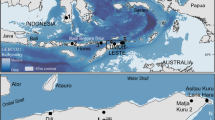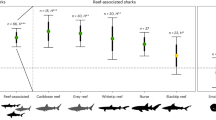Abstract
THE leopard-spotted goby was first discovered by G. R. Forster of the Plymouth laboratory of the Marine Biological Association in 1955, and was described as a new species, Gobius forsteri, by Corbin1. It is interesting that the original record was made while aqualung diving, and that subsequent evidence of the occurrence of the fish around British coasts has continued to be provided largely by divers' sightings and photographs. The apparent restriction of this locally common fish to crevices in rocky sublittoral areas had evidently prevented its discovery by conventional means of collection such as dredges and trawls, which are notoriously inefficient at sampling this type of substrate.
This is a preview of subscription content, access via your institution
Access options
Subscribe to this journal
Receive 51 print issues and online access
$199.00 per year
only $3.90 per issue
Buy this article
- Purchase on Springer Link
- Instant access to full article PDF
Prices may be subject to local taxes which are calculated during checkout
Similar content being viewed by others
References
Corbin, P. G., Nature, 181, 1659 (1958).
Miller, P. J., J. Mar. Biol. Assoc. UK, 49, 831 (1969).
Author information
Authors and Affiliations
Rights and permissions
About this article
Cite this article
HEMMINGS, C. First Record in Scotland of the Leopard-spotted Goby, Thorogobius ephippiatus. Nature 230, 580–581 (1971). https://doi.org/10.1038/230580b0
Received:
Revised:
Issue Date:
DOI: https://doi.org/10.1038/230580b0
Comments
By submitting a comment you agree to abide by our Terms and Community Guidelines. If you find something abusive or that does not comply with our terms or guidelines please flag it as inappropriate.



